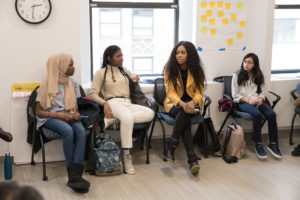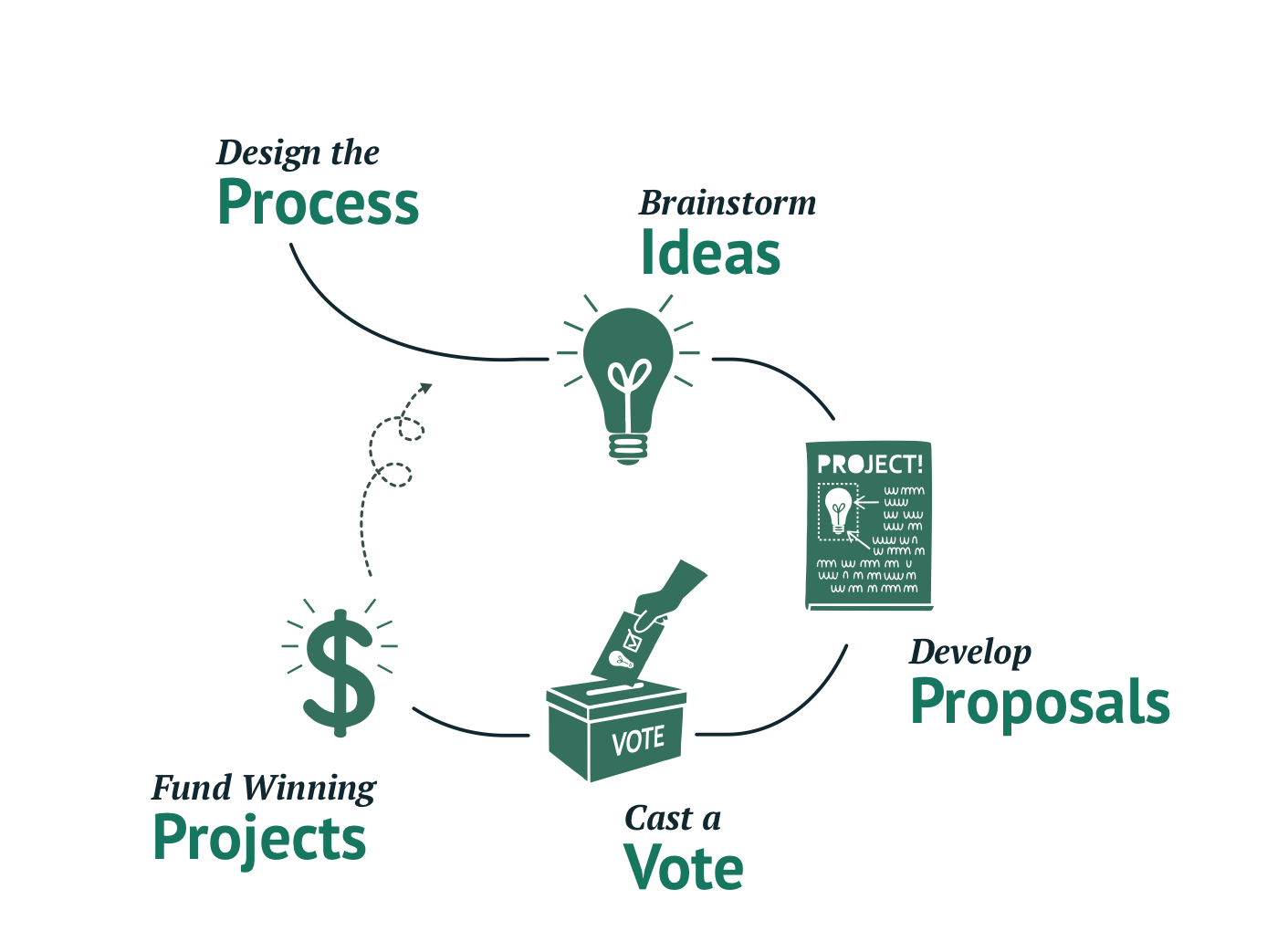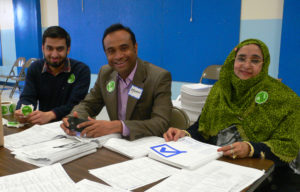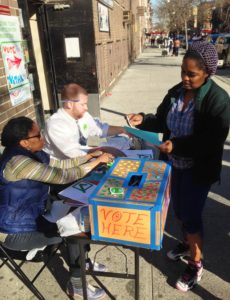In order to have engagement that is fair and equitable to all members of society, it is vital to be intentional when designing and facilitating those processes by asking, “who shows up?”. NCDD member org the Participatory Budgeting Project recently shared this article on how to make PB inclusive and fair, and there are some great tips to keep in mind for all our work. We encourage you to read the post below and find the original on PBP’s site here.
Making PB Inclusive and Fair
 Typically, when we want to know how inclusive and fair a Participatory Budgeting (PB) process is, we ask “Who shows up?” While this is a good starting point, it’s not enough. To meaningfully assess equity, we need to dig deeper.
Typically, when we want to know how inclusive and fair a Participatory Budgeting (PB) process is, we ask “Who shows up?” While this is a good starting point, it’s not enough. To meaningfully assess equity, we need to dig deeper.
Celina Su, Chair of Urban Studies at the City University of New York (CUNY) and Frankie Mercedes, former Communications Strategist with the Participatory Budgeting Project (PBP), joined forces to lead a stellar PBP Network Study Session, which addressed issues of equity and fairness in PB.
This blog post reviews the main points of their conversation, identifies common barriers to equal participation in PB, and suggests how to make PB more accessible to people with low incomes and to people of color.
“Who shows up?”
Public Agenda’s report on PB in North America found that during the PB vote, “In nearly all communities, black residents were overrepresented or represented proportionally to the local census among voter survey respondents.” In contrast, PBP’s internal evaluation data shows that white people, people with high or moderate incomes, and people with advanced degrees tend to be overrepresented in the steering committee and budget delegate role. The populations in the second group tend to have more time, flexibility, and financial security—factors that make them more likely to participate in more intensive aspects of PB.
 To create truly inclusive PB processes, low-income residents and people of color must be well represented on the steering committee and as budget delegates. The steering committee sets the rules for a PB process, and these rules ensure an inclusive and fair process. When low-income people and people of color are not in the room, steering committees miss valuable ideas on how to create a fair process.
To create truly inclusive PB processes, low-income residents and people of color must be well represented on the steering committee and as budget delegates. The steering committee sets the rules for a PB process, and these rules ensure an inclusive and fair process. When low-income people and people of color are not in the room, steering committees miss valuable ideas on how to create a fair process.
Here’s how you can make sure everyone shows up:
- Publicize and do outreach for all phases of the PB process—not just for idea collection and the vote.
- Provide 2-way transit fare for people who’ve identified need.
- Offer free, on-site childcare and food at PB events to boost engagement of women, parents, and low-income residents.
- Consider the location of PB events—Fancy venues or gentrified areas in a city may feel unwelcoming to some. Switch up the location of PB events to make sure that everyone feels welcome and feels ownership of their PB process.
“Who gets heard?”
Celina Su interviewed several PB participants about their experience in PBNYC, and she saw a pattern. People of color and people with low incomes felt that the PB process was frustrating and unfair. Highly organized groups, like parent-teacher associations from high-income neighborhoods, had a set agenda and dominated the budget delegate process.

The budget delegate stage is a very important part of PB. As volunteers, budget delegates select ideas from the idea collection phase and turn them into proposals that PB participants vote on. While residents can voice any priority during the idea collection phase, budget delegates work with staff to determine which ideas are eligible for PB funding.
In many cases, PB funding comes from an elected official’s capital budget. This means that a PB proposal has to be a capital project in order it to be eligible for funding. A capital project is a physical purchase (e.g. computer), construction, or renovation (e.g. a building).
When residents think about what their community needs, they may not think of physical infrastructure; they might think of training, programs, or other non-physical investments. Residents may struggle to think of physical changes that can address their community’s most pressing needs—like quality education and job access. And, because low-income residents and people of color are often underrepresented as budget delegates, they don’t have the same opportunities to pick ideas and tweak non-eligible ideas so that they fit into PB’s rules. This is why projects that benefit marginalized communities can fall off the table during the budget delegate phase.
During Celina’s interviews, residents also said it was intimidating to talk with elected officials and city staff. Many people don’t have experience talking with elected officials or speaking in the language of government and law. Without sufficient support mechanisms, this imbalance fosters an environment that privileges those with more education and knowledge of government and law.
Here’s how you can make sure that everyone’s voice is heard:
- Pay budget delegates and steering committee members
People who have the time and extra cash to volunteer tend to be of mid to high socioeconomic status. Paying residents for their time will incentivize people of all income backgrounds to participate in the time and energy intensive aspects of the PB process.
- Provide space for in-group deliberation
In-group deliberation gives residents from similar backgrounds (e.g. public housing, immigrant, age group, etc.) the opportunity to discuss, solidify and agree on priorities. For example, non-English single language meetings have been very successful.
- Offer training for government representatives
 Government representatives should make themselves open and available to their community. Simple changes in tone and body language can mean the difference between intimidating residents and engaging them.
Government representatives should make themselves open and available to their community. Simple changes in tone and body language can mean the difference between intimidating residents and engaging them.
Facilitators can help participants shape and develop their ideas and to ensure that certain groups don’t dominate speaking time.
“How does PB interact with society and government institutions?”
In her research on inclusion and PB in New York City, Celina notes that surveillance cameras are among the most popular projects in PBNYC. According to her report, they have “won funding every year so far.”
Celina sought to find out why cameras were so popular among NYC residents. She found that residents who wanted security cameras envisioned the cameras as part of a much broader program of public safety. Some residents’ vision of community safety included “greater police accountability and economic support as well as surveillance, and they crucially included bottom-up accountability and access to… [the video footage] captured by cameras.” But some residents were not aware that the New York City Police Department does not routinely make surveillance footage available to the public. On top of that, the economic and jobs programs that residents wanted did not qualify as capital projects and were therefore ineligible for PB funding. By the time PB voting began, NYPD-controlled surveillance cameras were the only thing left of residents’ vision for community safety.
Here’s some tips to equalize benefits from PB:
- Make equity and inclusion an explicit goal of the PB process
PB is about making communities stronger and more civically engaged. PB participants want to help make that goal a reality. When PB leaders encourage participants to center equity, they create an environment where participants actively consider the needs of other residents.
- Find or create a district profile
A district profile should describe the most important aspects of a community (e.g. educational achievement, income, ethnic composition). This will help residents identify what is going well in the district and locate areas for improvement. PBP’s list of community resources called Data for the People is a great starting point for gathering information about your community, as is the new tool developed by PBP, myPB.community.
- Let participants know how government agencies implement PB projects
 Some residents told Celina that they would not have voted for surveillance cameras had they known that the community would not have had control over the footage. It’s critical that PB participants understand the ramifications of what they are voting for so that they can make an informed decision.
Some residents told Celina that they would not have voted for surveillance cameras had they known that the community would not have had control over the footage. It’s critical that PB participants understand the ramifications of what they are voting for so that they can make an informed decision.
—
As a tool, PB is susceptible to the same challenges faced by any other civic process. However, because it’s flexible and includes community involvement at high levels, PB leaders and residents have the opportunity to design a PB process that’s both inclusive and fair.
Want more info on PB and Inclusion? You can find more resources below:
Report: Celina Su’s Research on Inclusion in PB
PB Study Session: Equity and Inclusion in PB (Video)
PB Community Tools: Data for the People
PB Tool: Outreach Toolkit
PB Study Session: Budget Delegates (Video)
Report: Celina Su’s Research on PB
Blog Post: Black Power through Participatory Budgeting
You can find the original version of this post on the Participatory Budgeting Project’s site at www.participatorybudgeting.org/making-pb-inclusive-and-fair/.
 Last month, veteran National Issues Forums (NIF) convener and moderator, Gregg Kaufman reported on a 16-forum public engagement project in the Jacksonville, Florida area, during February and March, 2018. The project was intended to help people in the community talk about Jacksonville’s history, and to deliberate about the best way to deal with controversial statues and monuments in the area.
Last month, veteran National Issues Forums (NIF) convener and moderator, Gregg Kaufman reported on a 16-forum public engagement project in the Jacksonville, Florida area, during February and March, 2018. The project was intended to help people in the community talk about Jacksonville’s history, and to deliberate about the best way to deal with controversial statues and monuments in the area.
 As part of
As part of  NCDD member org – the National Civic League, hosted the National Conference on Local Governance which was a jam-packed, one-day opportunity to dive into some of the cutting-edge practices and processes that improve equity within communities. Martín presented a session about Resident Engagement: How to Change Negatives in which he spoke about the neuroscience behind why traditional public engagement efforts often fall flat and how by designing better engagement processes, communities can be more effective in addressing challenging issues. It was a fantastic session with a perfect blend of information, while being engaging and entertaining! If you haven’t attended a session by Martín, I highly recommend you check one out the next opportunity you get! (Secret insider tip: He’s going to be running an exciting pre-conference session the day before NCDD2018 on Nov 1st that we encourage you to check out – Stay tuned to the blog for details to follow…)
NCDD member org – the National Civic League, hosted the National Conference on Local Governance which was a jam-packed, one-day opportunity to dive into some of the cutting-edge practices and processes that improve equity within communities. Martín presented a session about Resident Engagement: How to Change Negatives in which he spoke about the neuroscience behind why traditional public engagement efforts often fall flat and how by designing better engagement processes, communities can be more effective in addressing challenging issues. It was a fantastic session with a perfect blend of information, while being engaging and entertaining! If you haven’t attended a session by Martín, I highly recommend you check one out the next opportunity you get! (Secret insider tip: He’s going to be running an exciting pre-conference session the day before NCDD2018 on Nov 1st that we encourage you to check out – Stay tuned to the blog for details to follow…)

 To create truly inclusive PB processes, low-income residents and people of color must be well represented on the steering committee and as budget delegates. The steering committee sets the rules for a PB process, and these rules ensure an inclusive and fair process. When low-income people and people of color are not in the room, steering committees miss valuable ideas on how to create a fair process.
To create truly inclusive PB processes, low-income residents and people of color must be well represented on the steering committee and as budget delegates. The steering committee sets the rules for a PB process, and these rules ensure an inclusive and fair process. When low-income people and people of color are not in the room, steering committees miss valuable ideas on how to create a fair process.
 Government representatives should make themselves open and available to their community. Simple changes in tone and body language can mean the difference between intimidating residents and engaging them.
Government representatives should make themselves open and available to their community. Simple changes in tone and body language can mean the difference between intimidating residents and engaging them. Some residents told Celina that they would not have voted for surveillance cameras had they known that the community would not have had control over the footage. It’s critical that PB participants understand the ramifications of what they are voting for so that they can make an informed decision.
Some residents told Celina that they would not have voted for surveillance cameras had they known that the community would not have had control over the footage. It’s critical that PB participants understand the ramifications of what they are voting for so that they can make an informed decision.




